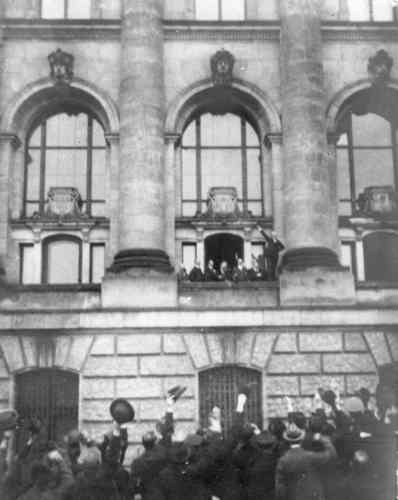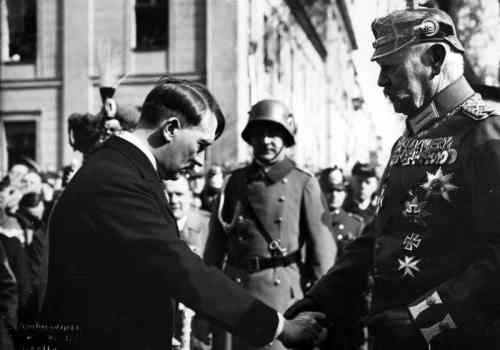The German Story
The most interesting fact about German history is that Germany did not exist as a nation until 1871. Before then it consisted of a number of states each with its own court, its own laws and customs barriers. Much the largest of these states was Prussia.
The credit (if one can use the word) for uniting these various kingdoms and grand duchies belongs to a Prussian statesman, Bismarck.
Between 1864 and 1871 he engineered three aggressive but successful wars against Denmark, Austria and France, and these victories so impressed the other German States that they entered a confederation under Prussian leadership. This confederation was called the German Reich, and the King of Prussia became German Kaiser (Emperor).
The vices of militarism and aggressiveness, often thought to be peculiar to the Prussians, soon infected the whole of Germany. The Germans acquired colonies, chiefly in Africa; they challenged British sea-power by building a powerful fleet. And in 1914 they thought they were strong enough to enforce an unchallenged, supremacy in Europe. In alliance with Austria-Hungary, Turkey and Bulgaria they fought and lost the First World War.
After the defeat of 1918 Germany went through a sort of revolution. This revolution was largely lath and plaster, but was accepted by the Germans because they are used to political shams. Some of the politicians of the German Republic, who succeeded the Kaiser in 1918, meant well: they established a parliamentary system which gave to the ordinary German more individual freedom from then to 1933 than before or since. But behind the scenes the real power still remained in the hands of the generals, the great industrialists and landowners and the professional civil servants. They waited and watched for a chance to assert themselves.
The chance came with the rise of Adolf Hitler.
|
Die Ausrufung der Republik durch Philipp Scheidemann markiert das Ende des Kaiserreichs. |
Rise of Hitler.
This ex-corporal of the First Great War was not even a German, but an Austrian who had fought in a German regiment. At first he was considered rather a joke, but his party, the National Socialist German Workers' Party (Nazi for short), gained millions of supporters during the great slump of 1930-32. He promised the workers a form of socialism; he promised the industrialists more power and bigger profits; he promised both that he would wipe out the Versailles Treaty and create a single "Great German" State. The" Nationalist Party (Junkers-that is, feudal landowners-generals and industrialists) believed they could use the Nazis to restore their old privileges. So they persuaded the President Field Marshal von Hindenburg, to make Hitler Chancellor of the Reich. This was in January, 1933.
To secure his election in March, Hitler engineered the Reichstag fire and by attributing it to the Communists made it the excuse for a reign of terror. But the elections in March did not give Hitler's party a clear majority, in spite of the flood of propaganda let loose in his favour from platform, press and radio; the Nationalists, however, supported him, and to make doubly sure he arrested various members of Opposition parties who might have voted against him.
His next act was to pass a bill which ended parliamentary government and made him Dictator of Germany.
Then he began to "discipline" the country. Law was suspended. Jews, Comunnists, Socialists, Liberals-anyone who had publicly opposed him-were hunted down by Hitler's private army, the Storm Troops, shot, beaten to death or systematically tortured in concentration camps. Hitler's aim was so to terrorise the German people that no one would dare to resist him by deed or word.
In spite of these bestial cruelties some Germans were brave enough to carry on the struggle against Hitler, but their power was small and most were killed, beaten into acquiescence, or forced to leave the country.
Meanwhile the army was rapidly growing; in 1935 conscription was reintroduced; the industrialists began to make great profits out of re-armament; the Junkers had their privileges confirmed, and the Nazis enriched themselves by plunder and confiscation.
|
Der Tag von Potsdam: Hitler verbündet sich mit dem alten Preußen |
Political Smash and Grab.
When Hitler had established his power in Germany he began to carry out his plan for conquering other nations. It was a plan which appealed to the Germans. In March, 1938, German troops occupied Austria: In September, 1938, at Munich, the British and French Prime Ministers, who knew their countries were quite unprepared for war, reluctantly agreed to the Nazi annexation of important border areas of Czechoslovakia, where many of the people were of German speech. In March, 1939, the rest of Czechoslovakia was occupied-a flagrant breach of Hitler's promise to Chamberlain only six months before.
It was now obvious to everyone that Hitler's dreams of conquest knew no bounds. His next victim was to be Poland. Prussia had held parts of Poland for a hundred and fifty years until, in 1918, the Poles at last won back their freedom. Now Hitler resolved to enslave them again. The British and French Governments solemnly warned him that an attack on Poland would bring both countries into the war.
Hitler, drunk with easy successes, did not believe that we would fight. He thought we were too "decadent". On 1st September, 1939, he seized the Free City of Danzig, his armies entered Poland and the Second World War had begun.
Herausgeber: Landesbildungsserver Baden-Württemberg
Quelle: https://www.schule-bw.de
Bitte beachten Sie eventuell abweichende Lizenzangaben bei den eingebundenen Bildern und anderen Dateien.




